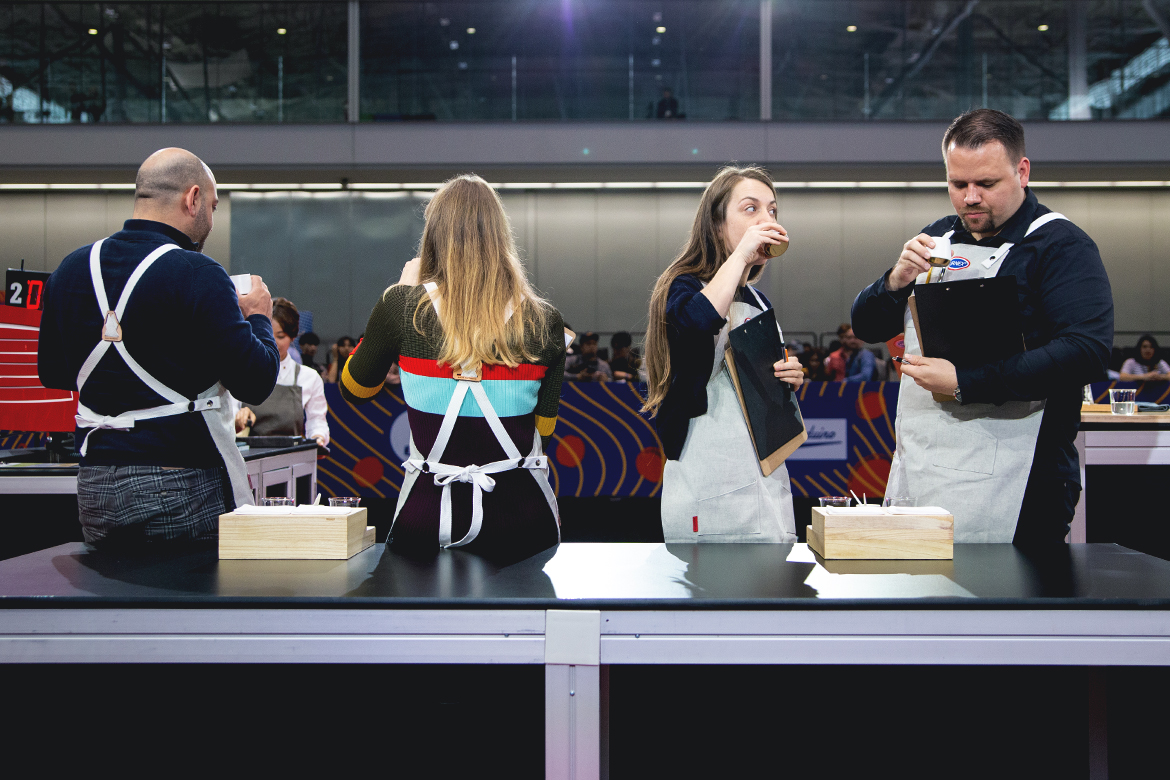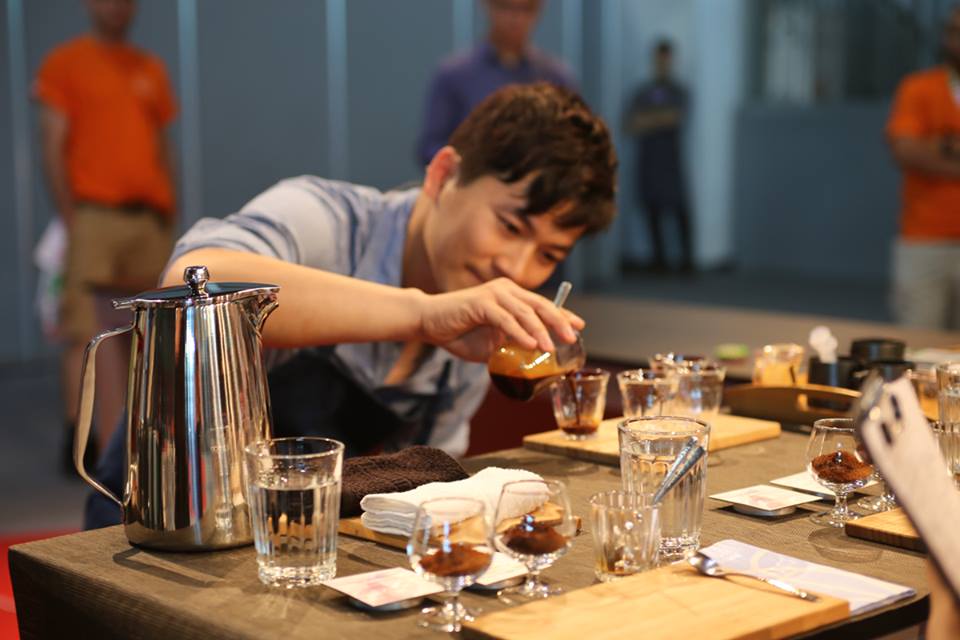Here we are. The biggest day of barista championship year. The Finals of the World Barista Championship. 50+ coffee professionals from around the globe descended upon Boston on Thursday to vie for a spot on this very day. After whittling down to 16 in the Semi-Finals, the competition was paired down even further to six for today.
It’s been a grueling four days of barista action, but these six Finalists are the creme of the crop. We’ve now seen each of today’s competitors routines three times, and with each subsequent viewing we find something new to pay attention to. So for the last time in the 2019 season, let’s look back at the day that was the Finals of the 2019 World Barista Championship.
All of SprudgeLive’s 2019 competition coverage is made possible by Acaia, Baratza, Faema, Cafe Imports, Wilbur Curtis, Third Wave Water, Minor Figures, and Mahlkönig.
In 2019 SprudgeLive is home to the Digital Roasters Village, because it takes a village to cover a barista competition. The Digital Roasters Village features Camber Coffee, Verve Coffee, Partners Coffee, Intelligentsia Coffee, Rishi Tea, Kickapoo Coffee, Blue Bottle Coffee, Onyx Coffee Lab, Creation Coffee, Amavida, and Equator Coffees without whom this work would not be possible.
Cole Torode, Rosso Coffee Roasters, Canada
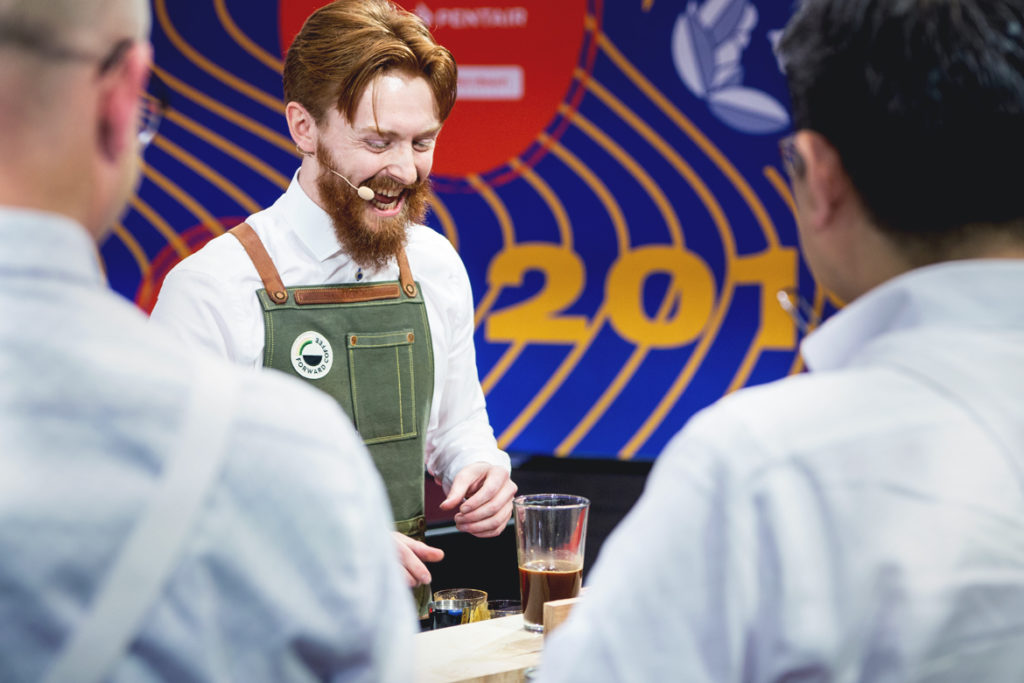
“Coffee is not about you, it’s not about me. It’s about us” — Cole Torode of @RossoCoffeeCo
Torode’s routine follows the progression of the same coffee over time: a crop harvested in 2018, one in 2019, then what the 2020 harvest may hold.
That coffee for Torode is a natural processed, anaerobic fermented Sidra variety coffee from @lapalmayeltucan in Tolima, Colombia.
Torode is multi-tasking pretty hard in the early part of his routine. While delivering quite a bit of script, Torode is pulling shots, is making tea in gaiwan, and is now steaming his milk.
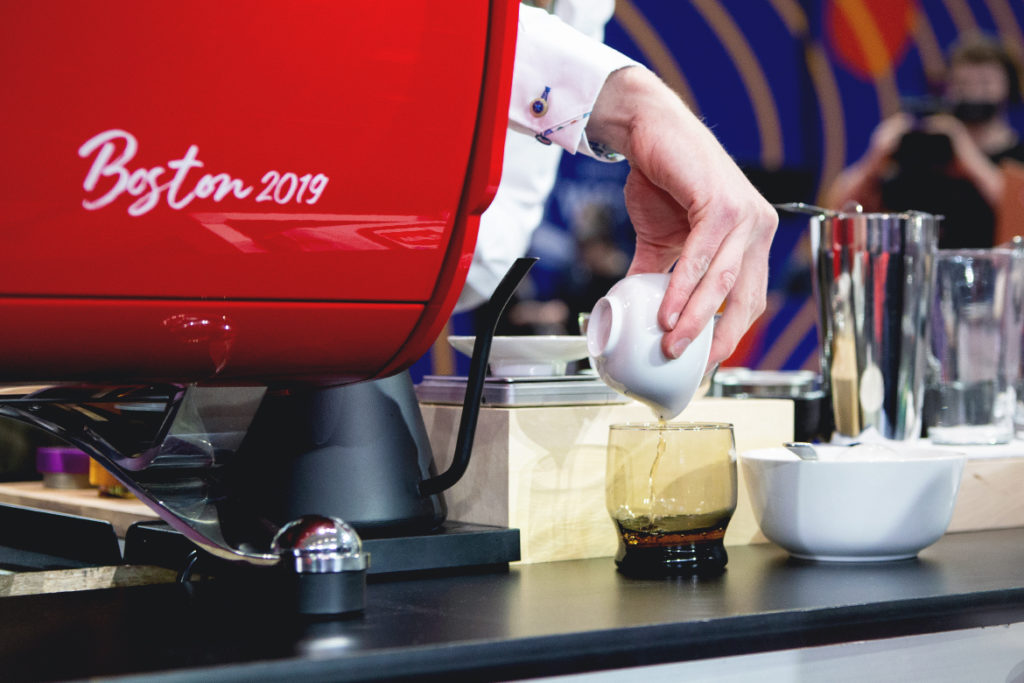
For the milk course, Torode is using the 2018 harvest of the Sidra—the exact same lot he competed with last year at WBC—combining it with freeze distilled milk for a beverage with notes of stewed apricot, nutella, melted chocolate ice cream, and vanilla wafer
Even while delivering flavor calls for his espresso course, Torode is prepping parts of his sig bev. There’s a lot going on in his routine, but Torode stays cool and has everything under control
For the sig bev, Torode looks for what Sidra could be in 2020. Combining a shot of each the ’18 and ’19 harvest with oven roasted green grapes puree, magnetic mixed, then a third steep Pu’erh is added, soft shaken over an ice sphere and double strained
Wojtek Bialczak, Five Elephant Coffee, Germany
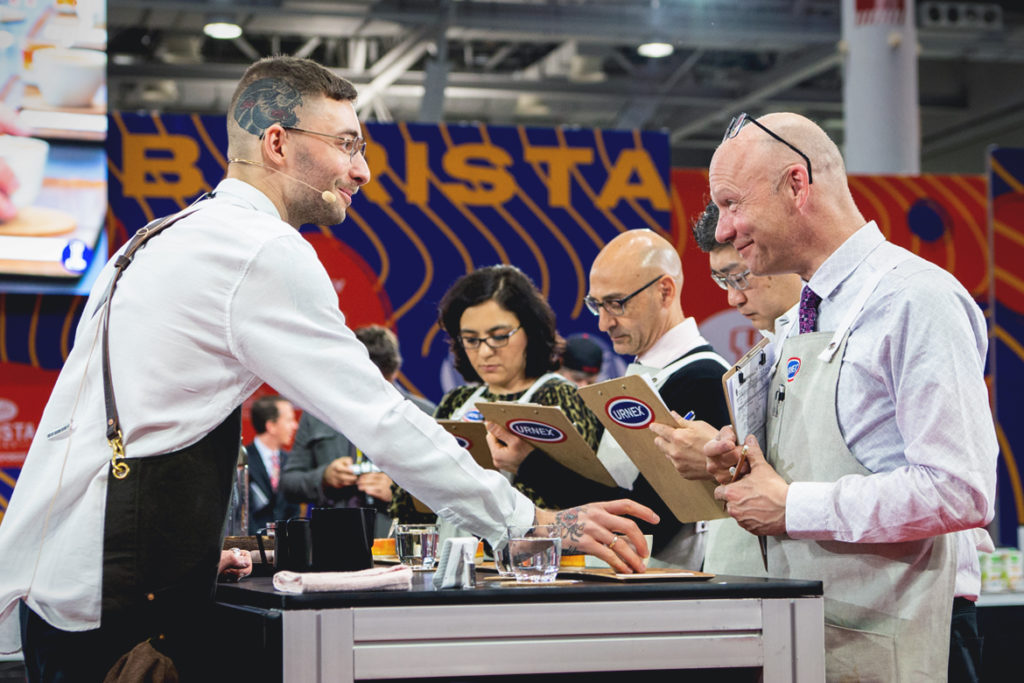
Bialczak begins his routine by making Amazake—a fermented rice beverage—to be used in his sig bev later on.
50 Ways to Leave Your Lover by Paul Simon starts Bialczak’s routine, and I’m kinda here for it.
Bialczak is taking the judges on a “candy shop tour” with his 3 courses today. Starting with espressos, judges will get to try a dried fruit like sweetness
Mandarin, marzipan, dark chocolate, dried papaya, cane sugar, and sweet passionfruit flavor calls in Bialczak’s espressos. Judges are instructed to wait until a timer hits :40, then stir until :50, and then drink.
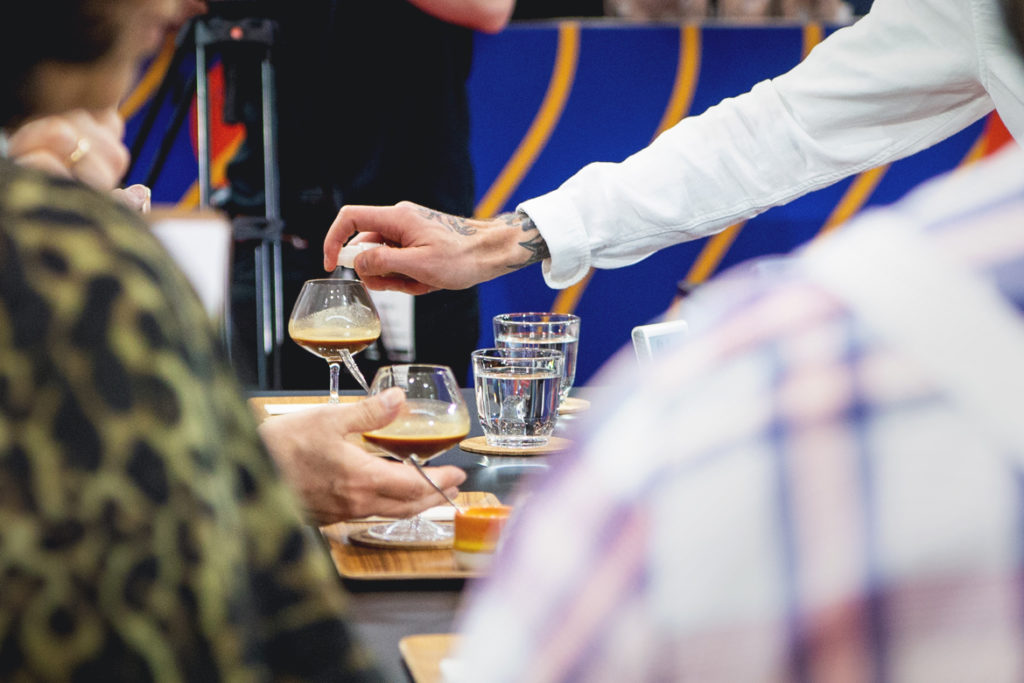
For his coffee, Bialczak competes with a natural processed Eugenioides variety produced by Las Nubes in Colombia.
For his milk course, Bialczak uses freeze distilled milk and Eugenioides to create a cortado with notes of nougat, salted caramel, dried dates, and cashews
Chilled espresso, amazake, elderberry juice, mandarin juice, and hibiscus, all shaken together in Bialczak’s sig bev. Served in snifter glasses and finished with a hop tea infusion mist.
We interrupt your regularly scheduled World Barista Championship coverage to bring you breaking news: @Mmmboni is wearing a dog on the WBC stage.
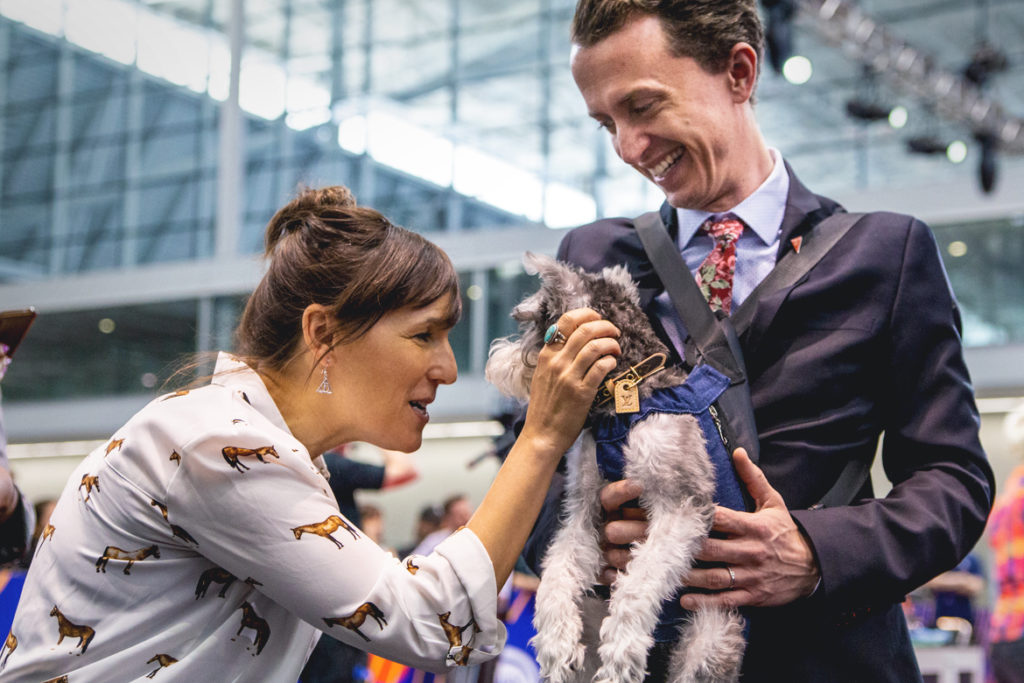
Michalis Dimitrakopoulos, The UnderDog, Greece
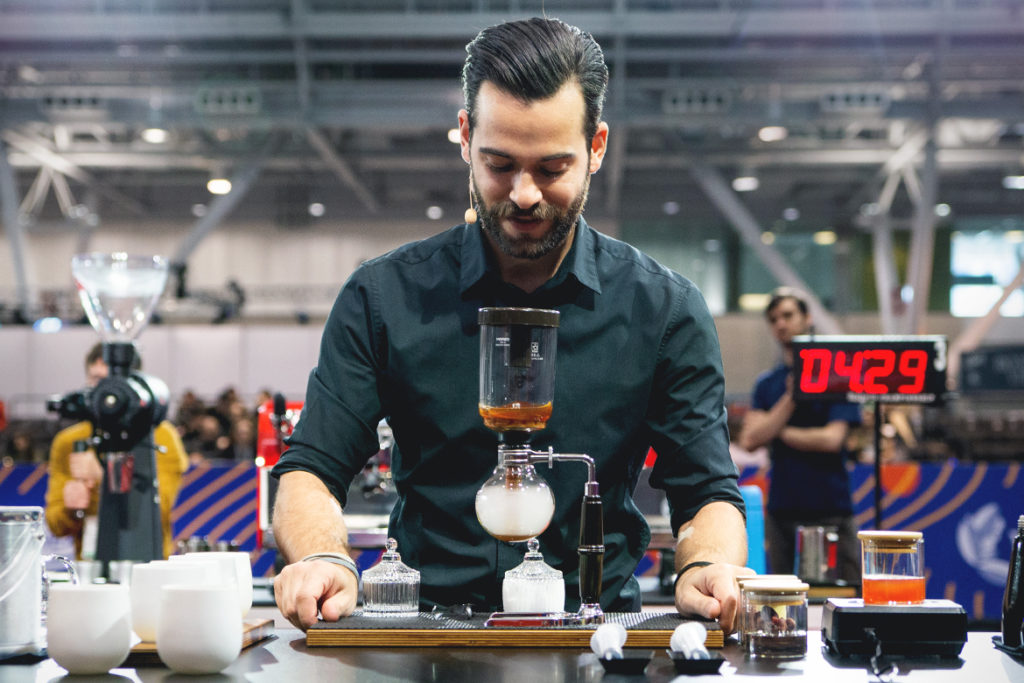
Dimitrakopoulos competes with an anaerobic fermented Gesha produced by Jamison Savage at @FincaDeborah in Chiriqui, Panama.
Preparing parts of his sig bev first, Dimitrakopoulos places a natural fermented Gesha cascara into a syphon along with dry ice, which pushes the liquid into the top chamber, mimicking the anaerobic environment the coffee was fermented in.
Switching to the first course, espressos for Dimitrakopoulos have notes of blackberry, grapefruit, and raspberry.
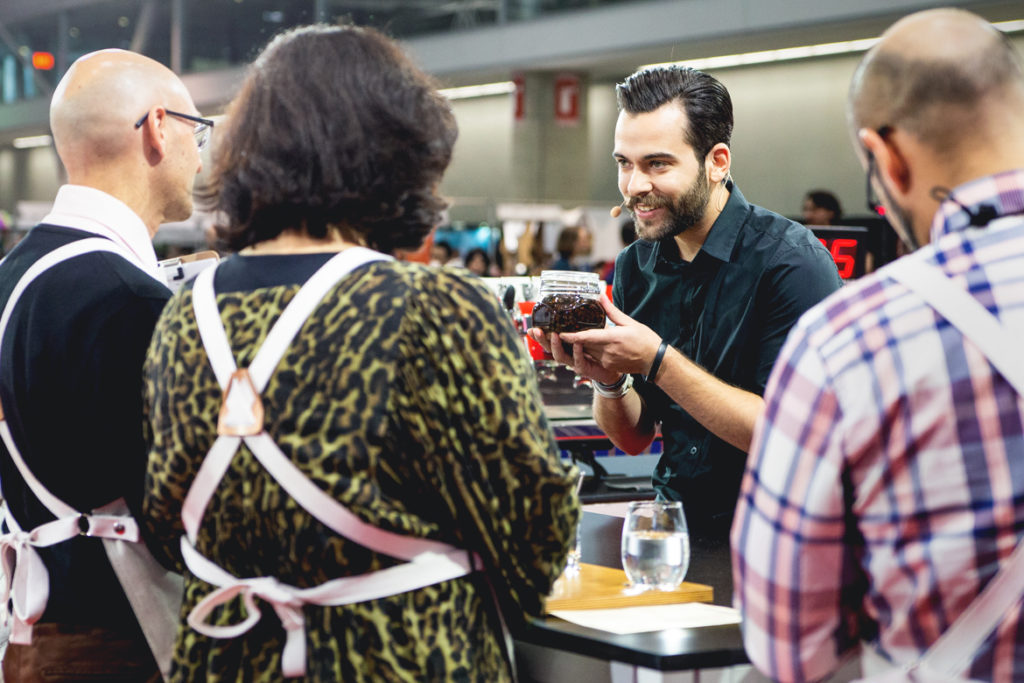
Switching now to the milk course, Dimitrkopoulos serves the judges 1:2 espresso to milk drinks, with notes of caramelized brown sugar, butter biscuits, walnut, and a blackberry finish.
Dimitrokopoulos is the 2016 World Coffee in Good Spirits champion who is now going for his second world title, which would certainly make him one of the most successful barista in coffee competition history. Will he set his sights on the Brewers Cup after that? WCC EGOT?
For his sig bev, Dimitrokopoulos combines that syphon cascara reduction with a sous vide mix of butter, dried strawberries, and sugar water. Those get put in a charger but use dry ice instead of nitro.
Mikael Jasin, Common Grounds Coffee Roaster, Indonesia
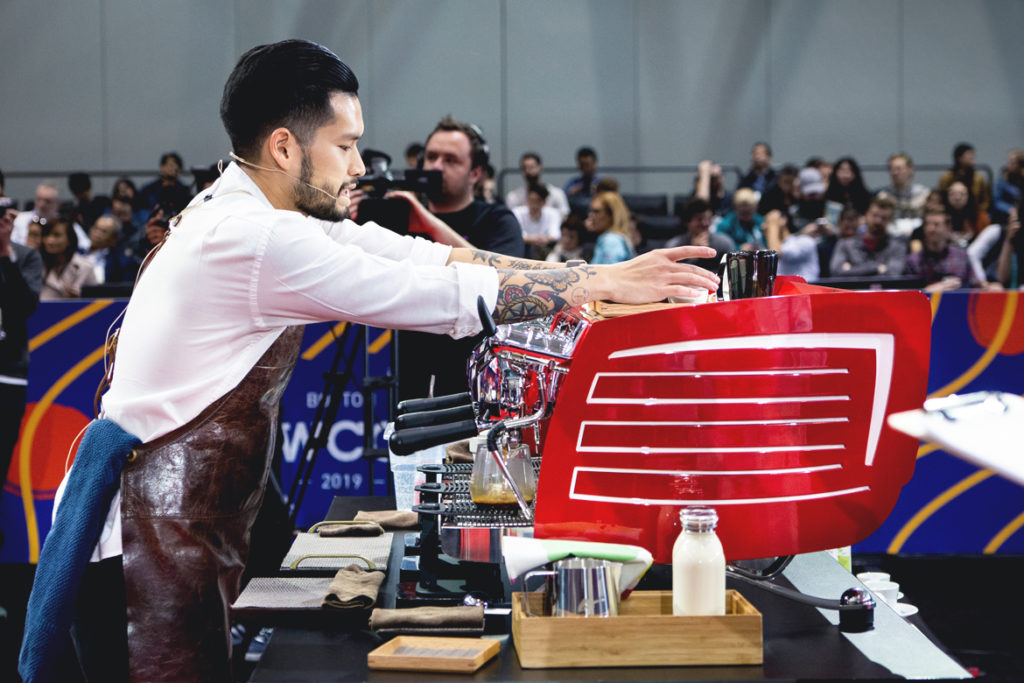
“I believe we can found ferment coffee with specific taste goals in mind. I call this ‘purpose-driven fermentation.’”
.@MikaelJasin will compete today with three different coffees, each with a different fermentation method chosen specifically for how it will affect the drink it will be used in.
.@MikaelJasin‘s first coffee—a Green Tip Gesha from @FincaDeborah in Panama—carbonic macerated to be “well-balanced, vibrant, and clear”
Rose aroma, orange vibrancy, and candy sweetness in @MikaelJasin‘s Green Tip Gesha espresso course.
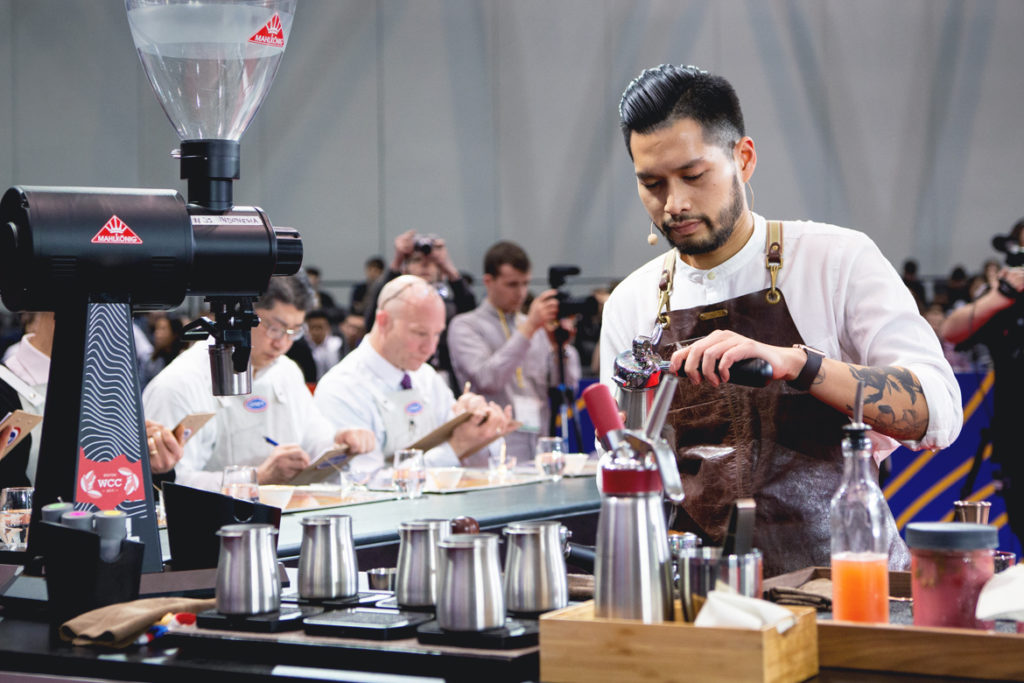
For the milk course: @MikaelJasin is aiming for “balance and clarity” in the coffee. For that he is using a carbonic macerated Heirloom coffee from the Guji Zone in Ethiopia produced by Project Origin.
For his sig bev coffee, @MikaelJasin is using the first ever Indonesian coffee to be carbonically macerated: a Longberry from the Wahana Estate in northern Sumatra. @FincaDeborah‘s Jamison Savage came to Indonesia to help oversee the fermentation
Along with the carbonic macerated Indonesian Longberry coffee, @MikaelJasin‘s sig bev incorporates rose, fermented strawberry juice, and carbonic macerated plum.
Mathieu Theis, Mame, Switzerland
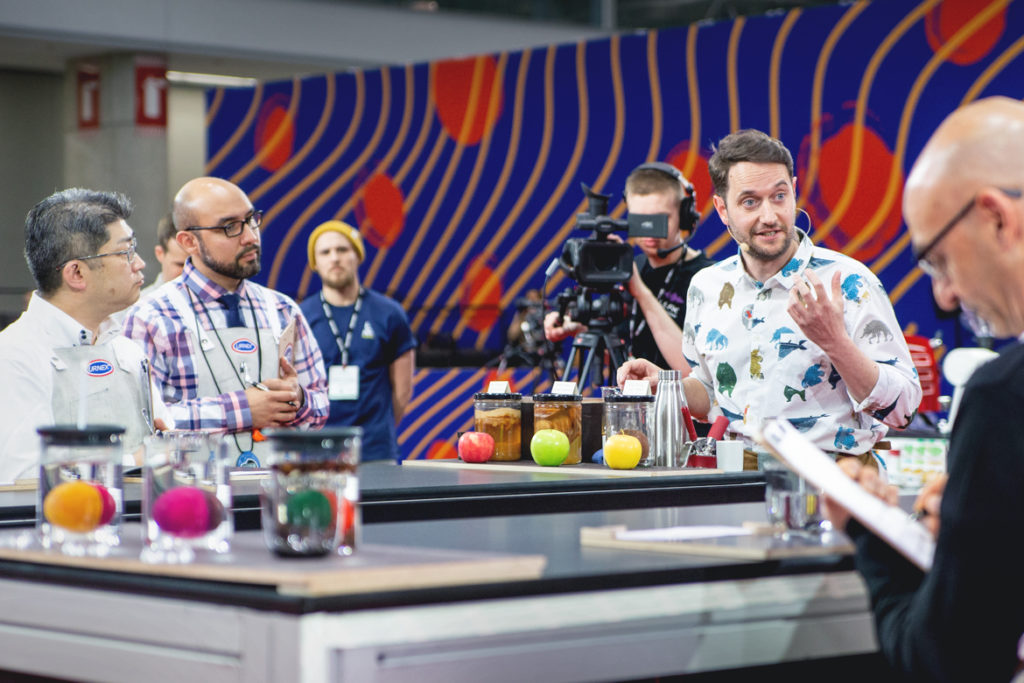
.@mati8050 competes with three different varieties grown on three different farms but with one unifying quality: tank fermentation.
“Buckle up, we’re taking off!”
For espresso, @mati8050 is using a semi-carbonic macerated coffee from Mina Gerais, Brazil—the “Lorena”—with notes of red grape, white wine, grapefruit, and pineapple
.@mati8050‘s shirt print game remains strong, though I have to say: whales and manatees alongside baboons and wolves? Water or land, pick a lane.
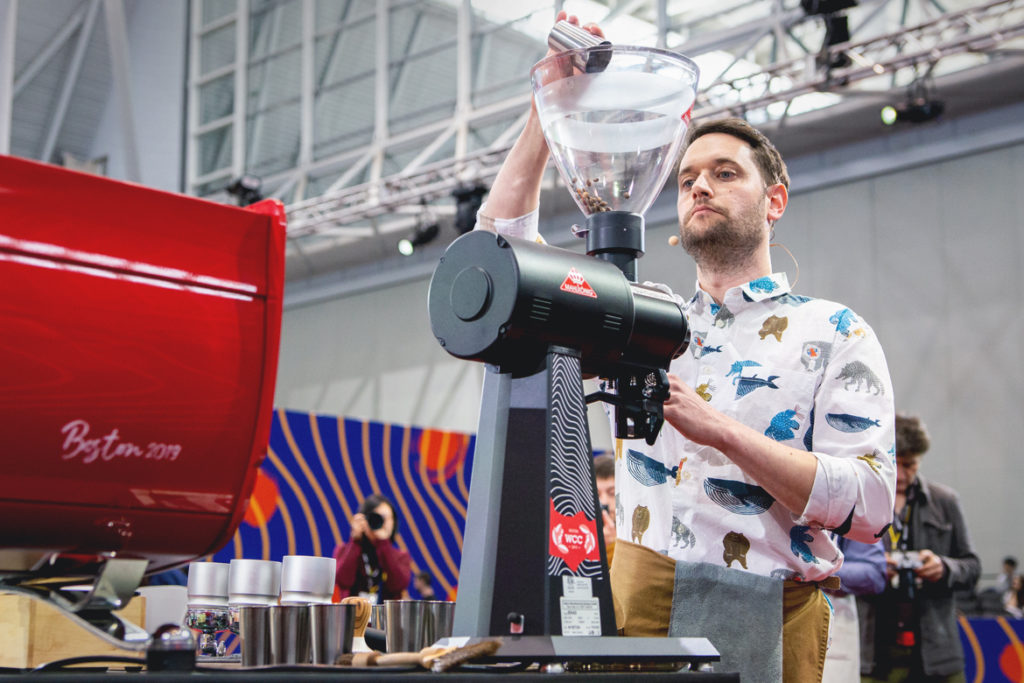
The stage setup for @mati8050 is incredibly unique, seating two judges at a table to his left and two judges at a table to right, allowing him to walk between the two.
For the milk course, @mati8050 switches to a Ugandan coffee from the Mzungu Project, combined with freeze distilled milk directly from Zurich, giving his cappuccinos notes of banana, melted chocolate ice cream, caramel
For his sig bev, @mati8050 switches to an H1 variety coffee from Costa, fermented with dry coffee cherry. To this he adds slow cooked Opal apples, Granny Smith apple vinegar, and Gala apple kombucha, all nitro infused
Jooyeon Jeon, Momos Coffee, South Korea
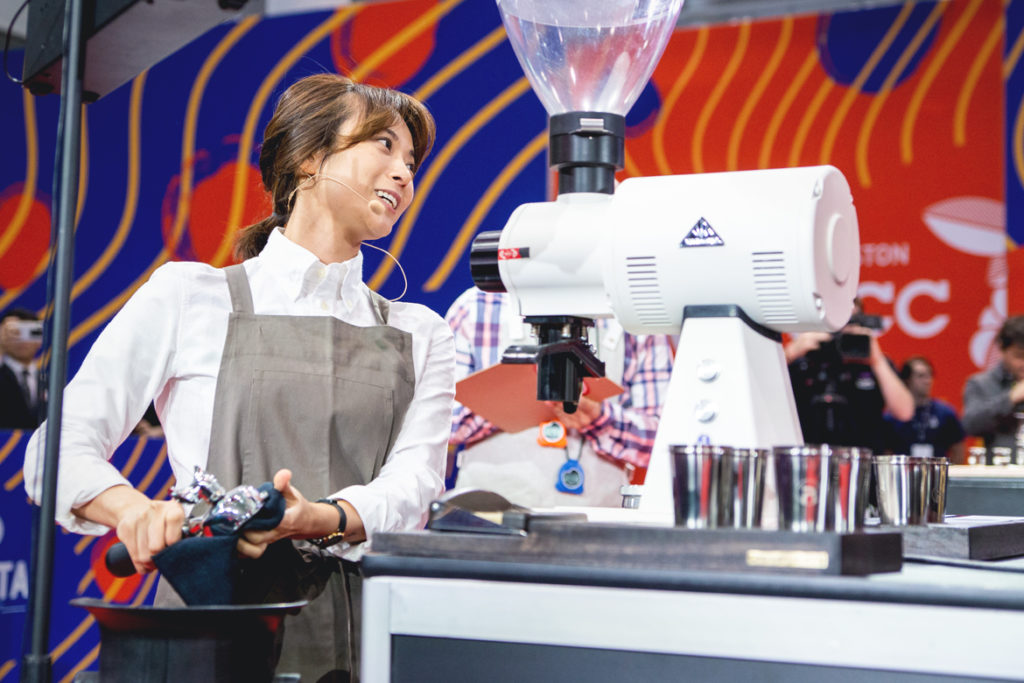
Before we start, can we just say how excited we are to get to see Jeon’s performance one more time? It has been a crowd favorite each round.
“I want us all to enjoy my coffee as friends, so say hello to each other,” Jeon instructs the judges as they sit on the table.
Jeon competes today with a Sidra variety coffee—a hybrid of Red Bourbon and Typica—grown by @LAPALMAyELTUCAN in Tolima, Colombia.
The theme of Jeon’s performance today is carbohydrates, specifically mono- and polysaccharides.
Notes of caramelized almond, white chocolate, and dried cranberries in Jeon’s 1:3 espresso to freeze distilled milk cappuccino course.
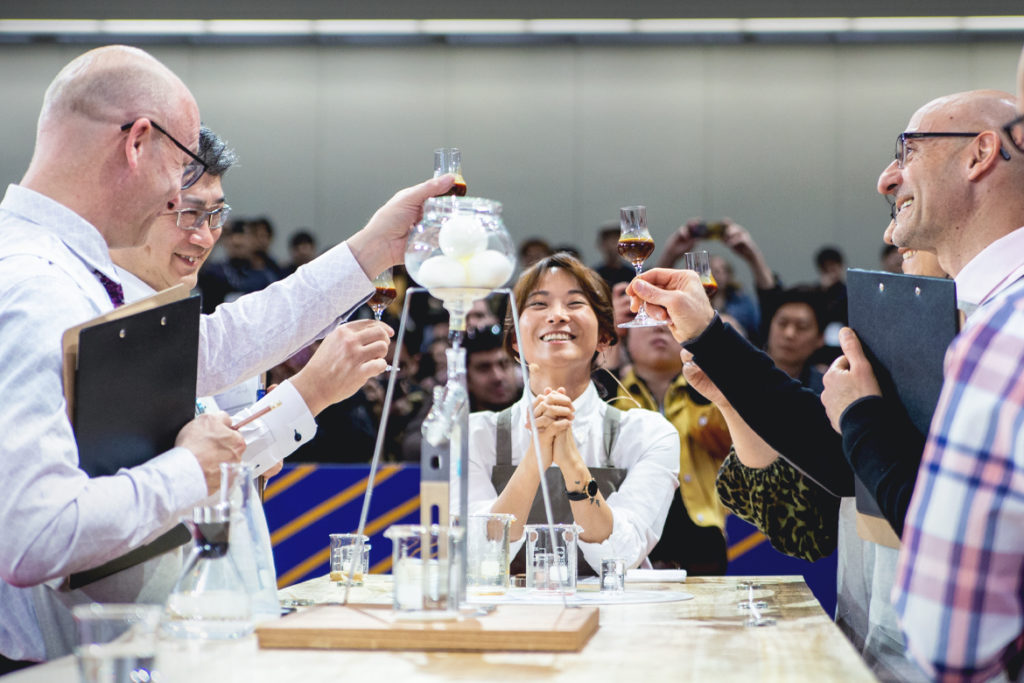
Blackberry, grape, plum, and blueberry jam in Jeon’s La Palma Sidra espresso course.
We’re 10 minutes in to Jeon’s routine and we’re already through an introduction and 2 beverage courses. She’s got more than enough time to get out those sig bevs and put a bow on her routine.
Malt and polysaccharide mixture, blackberry reduction, and espresso all get mixed together and served in long-stemmed tulip glasses for Jeon’s sig bev course.
Thanks for tuning in with us for our coverage of the 2019 World Barista Championship!
